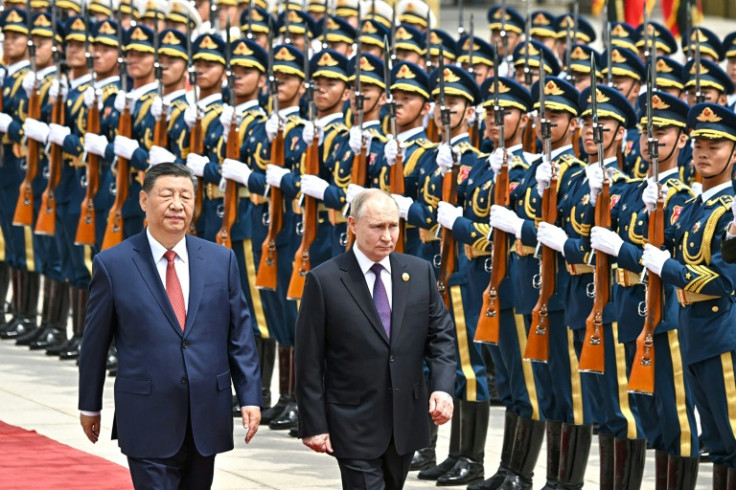Xi, Putin Hail Ties As 'Stabilizing' Force In Chaotic World

Leaders Xi Jinping and Vladimir Putin framed their nations' ties as a stabilizing force in a chaotic world as they met Thursday in Beijing, where the Russian president is seeking greater Chinese support for his war effort in Ukraine and isolated economy.
It is Putin's first trip abroad since his March re-election and the second in just over six months to China, an economic lifeline for Russia after the West hit it with unprecedented sanctions over its military offensive in Ukraine.
Putin was greeted by Xi at a grand welcoming ceremony outside Beijing's Great Hall of the People, footage by state broadcaster CCTV showed.
The national anthems of both countries and martial tunes played as the two leaders met, kicking off a two-day visit by Putin that is expected to see the countries deepen a relationship they have declared has "no limits".
In a meeting, Xi then told his "old friend" Putin that China-Russia relations were "conducive to peace".
"China is ready to work with Russia to... uphold fairness and justice in the world," Xi added.
"The China-Russia relationship today is hard-earned, and the two sides need to cherish and nurture it."
Putin, in turn, told Xi the two countries' relations were "stabilising factors in the international arena".
"Relations between Russia and China are not opportunistic and not directed against anyone," Putin said, according to a Kremlin readout.
"Together, we uphold the principles of justice and a democratic world order that reflects multipolar realities and is based on international law," he added.
The Russian leader's arrival came hours after he hailed his country's troops for advancing on "all fronts" on the battlefield in Ukraine, following a major new ground assault.
Xi, who returned last week from a three-nation tour of Europe, has rebuffed Western criticism of his country's ties with Moscow, enjoying cheap Russian energy imports and access to vast natural resources, including steady gas shipments via the Power of Siberia pipeline.
But their economic partnership has come under close scrutiny from the West in recent months.
US Secretary of State Antony Blinken, who met Xi in Beijing last month, warned China's support for Russia's "brutal war of aggression" in Ukraine had helped Russia ramp up production of rockets, drones and tanks -- while stopping short of direct arms exports.
China claims to be a neutral party in the Ukraine conflict, which it has never condemned and in which it has sought to frame itself as a mediator.
And in a statement to media following talks, Xi said the two sides agree on the need for a "political solution" to resolving the war.
"China's position on this issue has always been clear," Xi said in footage broadcast by a Russian TV.
That position included "respecting the sovereignty and territorial integrity of all countries" as well as "respecting the reasonable security concerns of all sides", the Chinese leader added.
The remarks echo a paper issued by Beijing last year, which Western countries said could enable Russia to hold much of the territory it has seized in Ukraine.
China also "looks forward to the early restoration of peace and stability on the European continent", Xi said, promising Beijing would "continue to play a constructive role to that end".
China-Russia trade has boomed since the Ukraine invasion and hit $240 billion in 2023, according to Chinese customs figures.
But after Washington vowed to go after financial institutions that facilitate Moscow, Chinese exports to Russia dipped during March and April, down from a surge early in the year.
An executive order by President Joe Biden in December permits secondary sanctions on foreign banks that deal with Russia's war machine, allowing the US Treasury to cut them out of the dollar-led global financial system.
That, coupled with recent efforts to rebuild fractured ties with the United States, may make Beijing reluctant to openly push more cooperation with Russia -- despite what Moscow may want, analysts said.
Eight people from both countries involved in cross-border trade told AFP in recent days that several Chinese banks have halted or slowed transactions with Russian clients.
Putin's post-election trip to Beijing echoes Xi's own visit to Russia after his re-anointing as leader last year.
The two leaders are set to sign a joint declaration following the talks, the Kremlin said, and attend an evening marking 75 years of diplomatic relations between the two countries.
Putin will also meet Premier Li Qiang -- China's number two official -- and travel to the northeastern city of Harbin for a trade and investment expo.
© Copyright AFP 2024. All rights reserved.





















